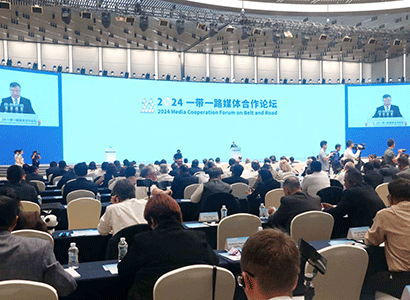Belt and Road media forum launches initiative to uphold ‘Silk Road spirit’
Chengdu, Sichuan: The Chengdu Initiative’s launch at the 2024 Media Cooperation Forum on Belt and Road seeks to encourage the media in Belt and Road Initiative (BRI) countries to tell stories about the global infrastructure project as it enters a new stage.
 |
Organised by the People’s Daily, the Sichuan Provincial Committee of the Communist Party of China, and the Sichuan Provincial Government on August 28, the forum in Chengdu brought together over 200 media executives, editors and reporters from 191 organisations across 76 countries, along with officials, experts, scholars and business representatives.
The launch of the Chengdu Initiative on Belt and Road Media Cooperation came as speakers at the forum shared views on its theme of “Enhancing Media Cooperation for Common Development”, which emphasised the need for the media to work together and broaden information sharing to showcase how the BRI impacts and shapes their countries’ economies and people’s livelihoods.
A document outlining the Chengdu Initiative states that BRI efforts have contributed to global connectivity, building a platform for economic cooperation and adding impetus to growth.
Since the BRI was proposed more than a decade ago, infrastructure connectivity in and among participating countries has advanced, with policy coordination strengthening and improving trade flow, the document noted, adding that BRI countries have enjoyed improved financial integration, and people-to-people bonds have been enhanced.
As the joint construction of the BRI enters a new stage of high-quality development, the document proposes that the role of cultural exchange and mutual learning in media cooperation should be furthered.
“Media from all (participating) countries should uphold the Silk Road spirit of peaceful cooperation, openness and inclusiveness, mutual learning, shared benefit and win-win, adhere to the principles of consultation, joint construction and sharing, disseminate fair, objective and true information, avoid bias, false news and misleading information, and strive to promote deeper connectivity,” the document stated.
The Chengdu Initiative proposes to harness the collective power of the media to “jointly tell stories about promoting common development, mutual benefit and win-win results, deepening regional cooperation, improving global governance, and promoting mutual learning among civilisations and connecting peoples,” it reads.
Looking ahead to the next decade, it said, the media from all BRI countries will “jointly inherit and carry forward the spirit of the Silk Road, cultivate the friendship of the Silk Road, promote high-quality joint construction of the Belt and Road.”
These efforts will also “help countries around the world to jointly achieve modernisation, build an open, inclusive, interconnected and jointly developed world,” it added.
Proposed by Chinese President Xi Jinping in 2013, in a revival of the ancient Silk Road, the BRI aims to promote common development with the ultimate goal of building a community with a shared future.
The BRI has been projected to substantially drive global economic growth and alleviate poverty.
The World Bank estimates that by 2030, construction of the BRI may generate annual benefits of US$1.6 trillion for the world, accounting for 1.3 percent of global GDP. The bank estimates that by 2030, BRI-related investment could lift 7.6 million people out of extreme poverty and 32 million out of moderate poverty.
The forum also featured parallel discussions and media tours to provinces in China that lasted until September 5 to showcase several projects and businesses under the BRI as well as nature-based and cultural attractions.
By Souksakhone Vaenkeo
(Latest Update September 6, 2024) |